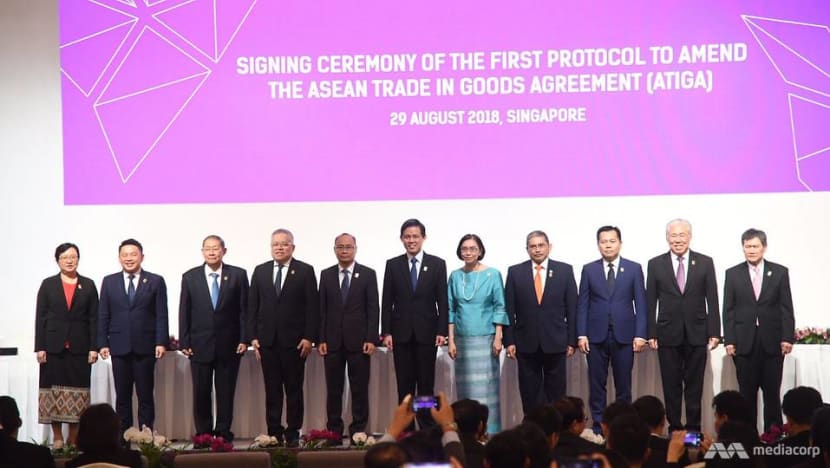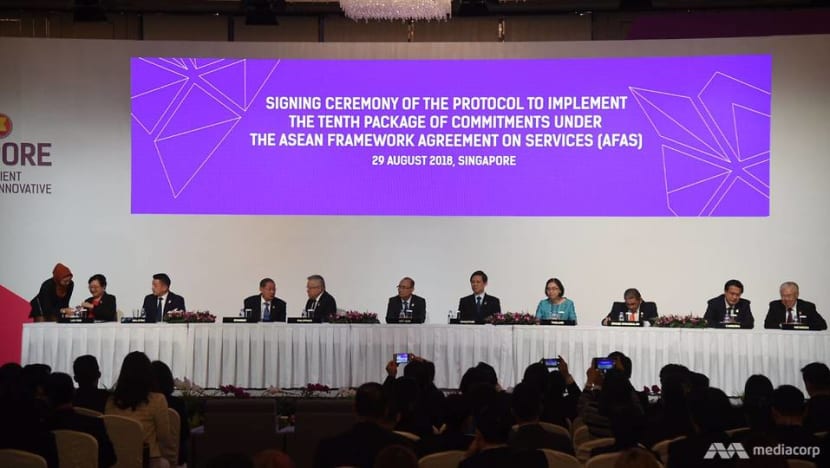ASEAN economic ministers ink 2 agreements to remove barriers in goods and services trade
The newly signed agreements will bring greater market access for services providers, as well as reduce administrative hassle and costs for businesses.

ASEAN officials at the signing ceremony of the ATIGA. (Photo: Tang See Kit)
SINGAPORE: Economic ministers from the Association of Southeast Asian Nations (ASEAN) on Wednesday (Aug 29) inked two agreements aimed at deepening the integration of the services sector and improving trade facilitation within the region.
This included the 10th package of commitments under the ASEAN Framework Agreement on Services (AFAS) – the final package to be concluded as part of a regional accord to progressively reduce restrictions on services trade. The AFAS was first signed in 1995.
Under the newly signed package, member states have increased the depth of their commitments and allowed market access into new services sectors, said Singapore’s Minister for Trade and Industry Chan Chun Sing.
This means that ASEAN services providers will now enjoy a “legally-binding guarantee of the widest preferential services market access” into ASEAN markets in the region's history, while facing fewer discriminatory barriers, he added in his opening remarks for the signing ceremony.
Services providers, including those based in Singapore, will also find it easier to participate in sectors that were previously closed in the region.
These include logistics, air transport, maritime transport, computer, telecommunications, tourism, construction service sectors, and professional services.

A protocol to amend the ASEAN Trade in Goods Agreement (ATIGA) was also signed on Wednesday, paving the way for the implementation of the ASEAN-wide self-certification (AWSC) regime.
The new regime, first mooted by the grouping’s economic ministers in 2009, will allow certified exporters to self-certify the origin of their exports and enjoy preferential treatment, said Mr Chan.
This benefits both importers and exporters as it does away with the administrative hassle and additional costs to do with the application of a Certificate of Origin. It also helps improve efficiency for issuing authorities.
Singapore-based exporters, for instance, can potentially enjoy annual savings of about half a million dollars, the minister said.
With the two agreements being longstanding initiatives that have been much anticipated by the private sector, Mr Chan said they will contribute to a more open and facilitative business environment in ASEAN.
“Goods and services trade continue to be integral to our regional economic integration journey, and are the foundations of our regional trade architecture," he said. “They will help us to navigate the issues of today and the future, and continue to help us seize opportunities."
Meanwhile, two agreements that would support regional e-commerce flows and power the digital economy were also endorsed.
They are the ASEAN Digital Integration Framework - which will assist member states in improving the digital ecosystem and monitor progress in the region’s digital integration - and the ASEAN agreement on e-commerce.
The latter is the grouping’s first agreement in this area, and will be signed on the sidelines of the 17th ASEAN Economic Community (AEC) Council Meeting in November.
Separately, a memorandum of understanding aimed at providing more support for start-ups and businesses in Japan and Singapore was signed by both countries on the sidelines of the annual meeting held at Shangri-La Hotel.
Economic ministers and diplomats from the 10 ASEAN member states are gathered in Singapore this week for the annual ASEAN Economic Ministers’ (AEM) Meeting and related meetings with key counterparts across the region.
Singapore is the ASEAN chair this year.















